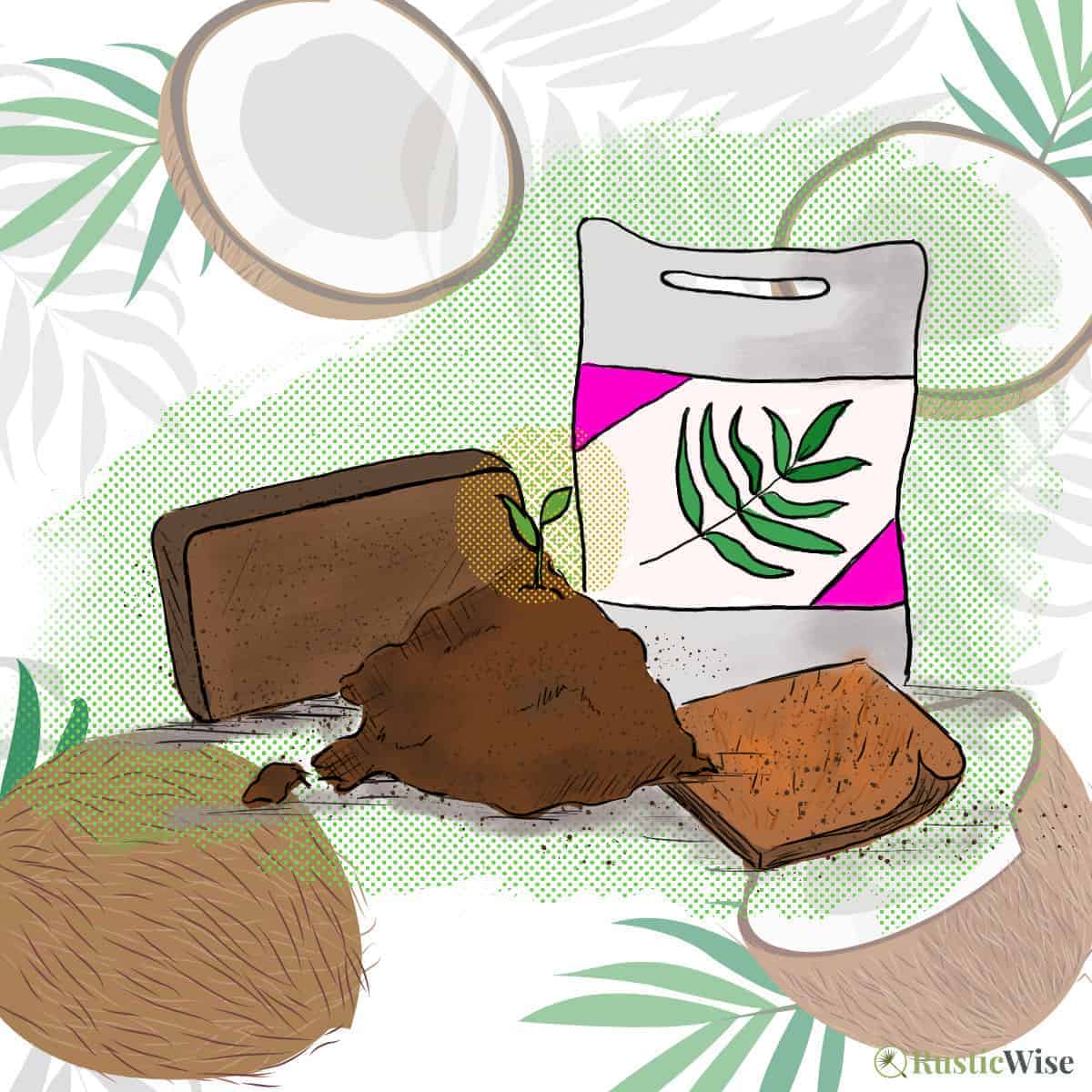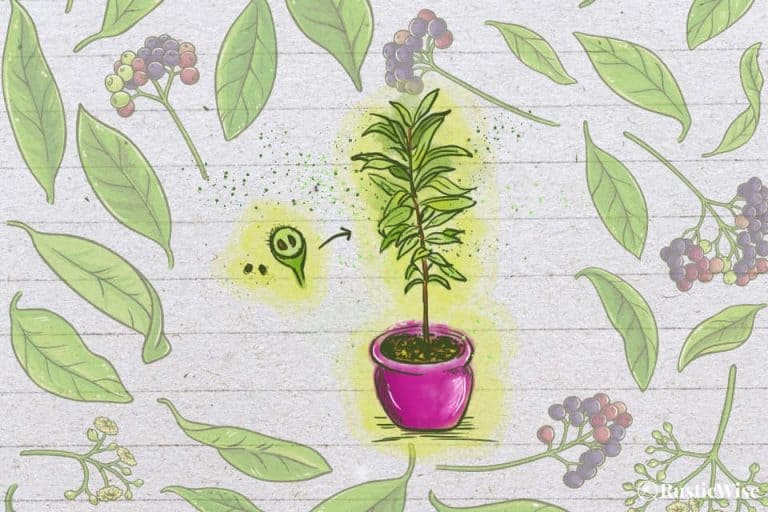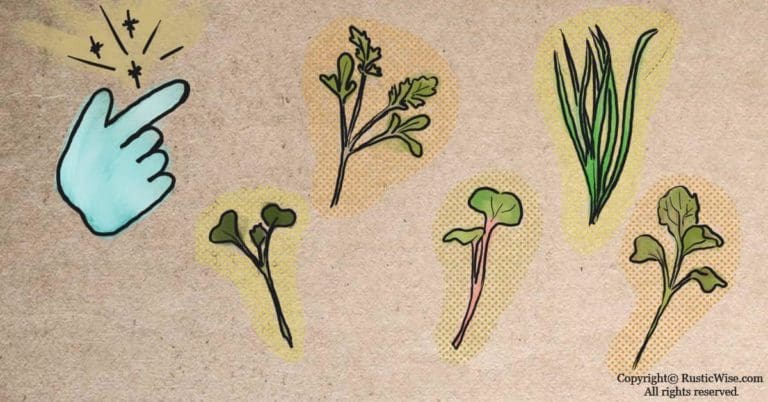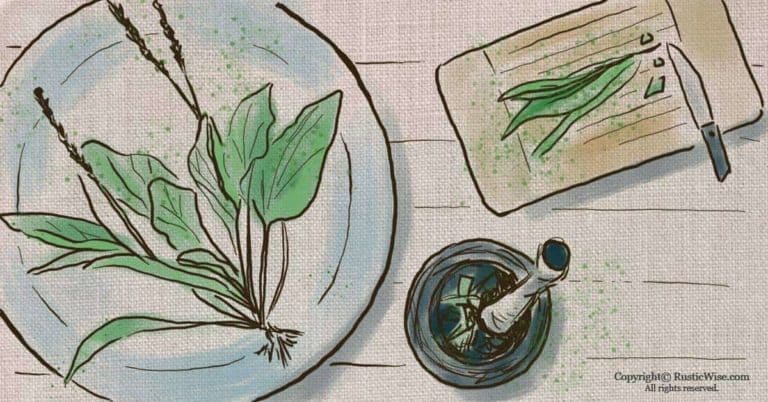A Roundup of the Best Coconut Coir for Microgreens
RusticWise is supported by its readers. When you purchase through links on our site, we may earn an affiliate commission. As an Amazon Associate, we earn from qualifying purchases. Thank You!
Look up “how to grow microgreens” and most articles and videos will mention coconut coir. It’s a great alternative for those who want to skip traditional soil-based growing medium, or perhaps want to amend potting soil with a bit of coco coir.
Made from coconut husks, coir is a much more sustainable option than peat moss. If you are considering switching over to coconut coir, here are a few things to look for when buying the best coconut coir for microgreens. Look for labels such as “low EC” which stands for electroconductivity, or “low salt.” And stick with certified organic if possible.
Let’s take a closer look at the qualities of this eco-friendly grow medium, plus a roundup of our top picks.
A closer look at coconut coir
Coconut coir is a natural growing medium that is made of coconut husks. The husk is a byproduct of the coconut industry and is a sustainable and renewable resource that is found in abundance in tropical regions where coconut palm trees (Cocos nucifera) are grown.
The processed coconut pith is used to make coir which is also called coco peat, or coconut dust. (I’ll be using these terms interchangeably throughout this article.)
Coir comes from the coconut fiber in the husk and is perfect for creating a soilless or hydroponic medium for growing plants.
What’s so good about coco coir?
Coco peat has several benefits that make it ideal for microgreen seeds germination.
- Retains moisture.
- Provides good root aeration with its light and well-draining structure.
- Naturally free of pathogens that may be present in regular potting soil.
- Creates an all-around excellent growing environment for healthy root growth.
- Biodegradable and compostable.
- More environmentally friendly than peat moss.
The major drawback of coco coir is that it lacks the nutrients found in traditional potting soil or seedling mix. Many growers may choose to add fertilizers or mix coir with some regular soil or compost for a nutrient boost. Another downside is that some types of coir may contain high salt levels.
👉Check out more details about the pros and cons of growing microgreens with coconut coir.
Main forms of coco coir
When you’re buying this soilless medium, you’ll find that it comes in several forms:
- Coco coir bricks: Also called blocks or briquettes, these compact packages are compressed coco pith which you’ll need to rehydrate and mix with warm water. These are the most economical and offer the easiest storage if you’re short on space. The downside is that it requires a bit of extra work (but it’s well worth it!).
- Coconut grow mats: If you’re looking to grow hydroponically, you can find coco coir growing mats to use in trays. You can trim mats to fit your microgreens tray.
- Ready-to-use coco coir: Some types of coco dust come as loose soil mixes in bags. Some are mixed with other soilless growing medium for microgreens, such as perlite. While these ready-to-use varieties are more convenient, they often have a premium price tag.
What to look for in coconut coir for microgreens
Not all types of coco coir are of equal quality. While the source material comes from the same organic matter (the outer husks of the coconut fruit), the harvesting and processing methods can vary.
After extracting the coconut husks, they leave the husks to cure for several months. Some manufacturers soak the fibrous husks in a salty brine solution. If not rinsed well during processing (or if salt water is used), the high levels of salt can result in a subpar growing medium (which will affect microgreen growth).
Tip: If you have a coconut coir brick of uncertain quality, play it safe and try leaching the fibers with water before using.
With that being said, let’s check out a few important qualities to look for when buying coco coir:
- Low salt or low EC: Products labeled as “low salt” or “low EC” which stands for electroconductivity will have taken extra steps during production to rinse the fibers well. Often this is done with fresh water rather than salt water. Coir with excess salt won’t provide the best growing substrate if you want to grow strong, healthy micros.
- Organic: While not absolutely necessary, it’s nice to work with products that are organic when growing your own food. Crops like micros have such a short growth cycle, and you really don’t want to be adding any harmful chemicals to these tiny greens. Look for products with the OMRI Listed® seal. These products have passed rigorous standards that meet “certified organic production, handling, and processing…”¹
- pH neutral: You’ll want to find coco peat that has been tested for pH neutrality. Having pH levels that fall within the mid-range neutral zone is ideal for growing microgreens at home.
A roundup of the best coconut coir for microgreens
If you don’t feel up for sifting through hundreds of online listings to find the best coco coir for microgreens, we don’t blame you. Luckily, we did a bit of research here for you.
Whether you decide to buy one of the following listings below or do your own research, keep an eye out for the guidelines I’ve outlined above, and you won’t go wrong. Find a reputable source with positive online reviews.
The following items are listed in no particular order.
Coco Bliss Premium Coconut Coir Pith 10 lbs. Brick/Block
These 10-pound bricks will provide plenty of coir for all your growing needs. This is OMRI listed for organic use and contains only 100 percent pure coconut pith and fibers sourced from southern India.
With many rinse cycles using fresh water, Coco Bliss has low levels of EC and doesn’t use any steam or harmful chemicals during production.
You might like
Coco Bliss Coconut Coir Pith 10 lbs. Brick
- OMRI listed for organic use.
- Neutral and stable pH: 5.8-6.8.
- Moisture content: 10-15 percent.
- Compression ratio of 5:1.
Found on Amazon
Check Current Price
Those in Canada and the UK should be taken to the product listing in your region.
Minute Soil Compressed Disc Coco Coir Fiber Grow Medium
These small coco soil discs made by Mountain Valley Seed Company are handy for the microgreens farmer. This 10-pack of discs (each 100 mm) makes roughly 4.25 gallons of potting substrate.
Simply add 3 cups of water to each disc to reconstitute the growing medium. Each disc expands roughly 15 times and produces about 8.5 cups of coco coir per disc.
This product is OMRI listed for organic use and is raw and non-amended (you’ll need to add your own fertilizer). Great for starting microgreens and wheatgrass.
You might like
Minute Soil Compressed Disc Coco Coir 10-pack
- 10-pack of discs (each 100 mm) of raw coco coir.
- OMRI listed for organic use.
Found on Amazon
Check Current Price
Those in Canada and the UK should be taken to the product listing in your region.
Thunder Acres Coco Coir Brick
Here’s another OMRI listed brick for organic use. Each brick is 1.5 pounds, which will hold roughly 8 to 10 times its volume in water. This brick has a neutral pH of 5.8–6.8.
To use, simply add warm water and let it soak for at least 20 minutes before use. The manufacturer suggests mixing 1 part coco coir to 2 parts quality potting mix for best results.
You might like
Thunder Acres Coco Coir Brick
- Each brick is 1.5 pounds.
- OMRI listed for organic use.
- pH of 5.8–6.8.
Found on Amazon
Check Current Price
Those in Canada and the UK should be taken to the product listing in your region.
Coconut Coir Hydroponic Grow Mat
If you prefer a coco coir growing mat over a brick, here’s a solid one made by the Mountain Valley Seed Company. This woven growing pad comes in a pack of 10, with each measuring 10 X 10 inches. Perfect for 1010 grow trays for micros and wheatgrass.
Each mat has a very thin layer of natural rubber to help hold the shape. Toss it in the compost afterwards (but the rubber may take a while to break down).
You might like
Coconut Coir Microgreens Mat
- 10-pack of woven grow mats, each 10 X 10 inches.
- Thin rubber layer helps retain shape.
- Compostable.
Found on Amazon
Check Current Price
Those in Canada and the UK should be taken to the product listing in your region.
Mother Earth Coco + Perlite Mix
Don’t want to bother with rehydrating a coco pith block?
Here’s a big bag (50 liters) of a loose, ready-to-use mixture of 70 percent coconut coir and 30 percent perlite. The addition of perlite makes for excellent drainage and good aeration. It also resists compaction in containers.
You might like
Ready-To-Use Coco Coir + Perlite Mix
- Loose coconut coir soilless mix.
- Composed of 70% coir and 30% perlite.
- Excellent drainage.
Found on Amazon
Check Current Price
Those in Canada and the UK should be taken to the product listing in your region.
Grow Organiks Coco Coir Pith Brick/Block (11 lbs.)
Here’s a quality coco peat block free of harmful pathogens. The processing methods use fresh water to produce low EC fibers within a neutral pH range.
OMRI listed for organic use, the brick expands between 5 and 7 times its size when it’s rehydrated. It produces roughly 70-75 liters of growing substrate.
You might like
Grow Organiks 11-pound Coco Coir Brick
- OMRI listed for organic use.
- Neutral pH range, low EC ratio.
- Make about 70-75 liters of coir.
Found on Amazon
Check Current Price
Those in Canada and the UK should be taken to the product listing in your region.
👉 If you like this post, see our Complete Guide to Growing Microgreens at Home. 🌱
Would you like more timeless tips via email?
Fun tips to help you live an independent, self-sustaining lifestyle. Opt-out at any time.


References
- The Organic Materials Review Institute (OMRI), About OMRI Listed Products, https://www.omri.org/about-omri-listed-products. Accessed November 2022.

Author: Josh Tesolin
Josh is co-founder of RusticWise. When he’s not tinkering in the garden, or fixing something around the house, you can find him working on a vast array of random side projects.















